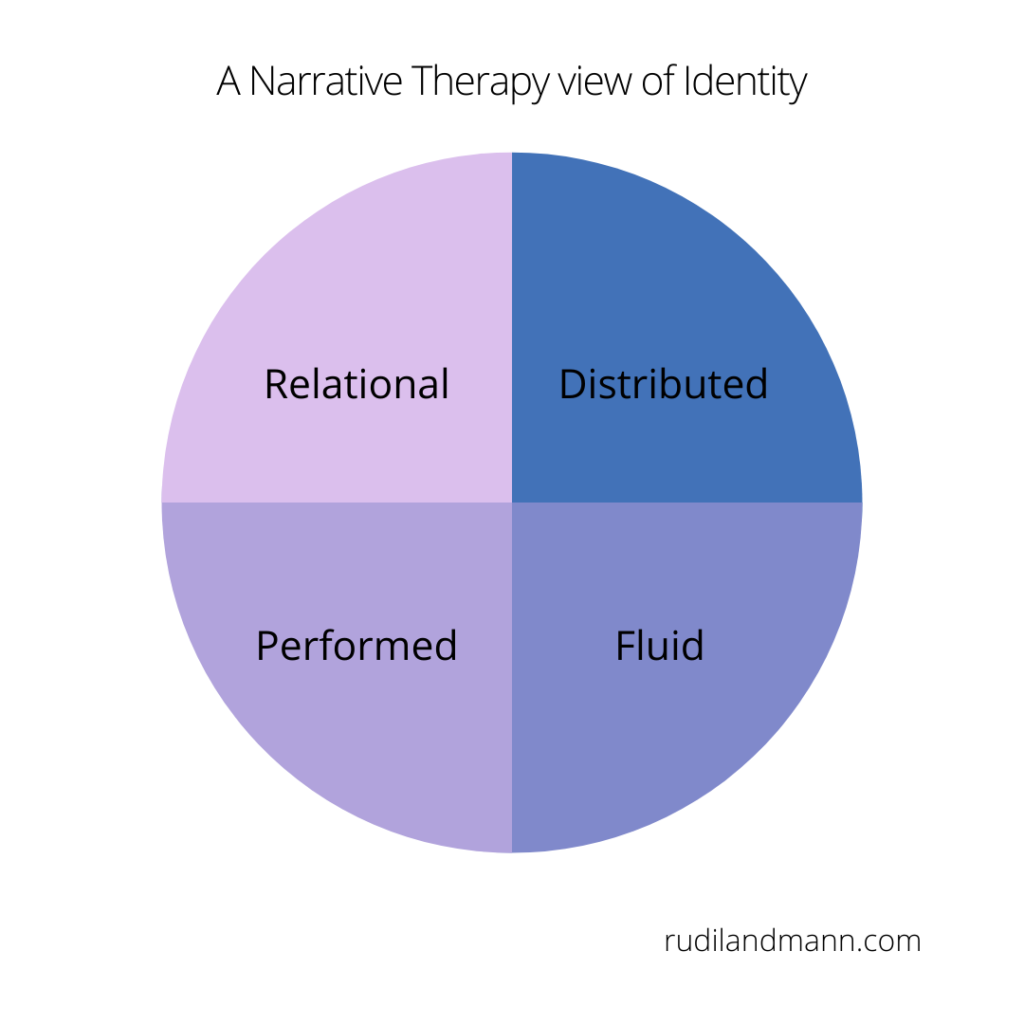I’m currently studying Narrative Therapy as another tool to help people during coaching sessions. Basically, Narrative Therapy helps us to become conscious of the stories we tell about our lives and to question how (or if!) those stories reflect our values and what we want for our lives.
One thing that has really fascinated me in the course is the way that Narrative Therapy understands identity.
Traditionally, we might think of identity as made up of fairly static collection of qualities or traits, strengths and weaknesses, motivations and needs. For example: ‘I’m a bit of a perfectionist’ is a statement of identity based on a trait.
But Narrative Therapy sees identity in a completely different way, as created from four different elements rather than static attributes. Identity is understood as:
- Relational
- Distributed,
- Performed
- Fluid
Let’s look at each of these in turn.
Relational
Our understanding of ourselves does not exist in a vacuum: it is shaped by our interactions with others. We become different versions of ourselves in the company of different people, and how they respond and react to us. The version of ourselves that appears in any particular story appears as our response to others’ expectations of us, or what we believe those expectations to be.
Distributed
Identity is seen as distributed in that we construct our sense of self from information and cues that are spread across multiple locations. A souvenir from a holiday, a social media update, a certificate from a course we’ve completed all serve to reinforce a particular identity. And, overlapping with the ‘Relational’ element, the versions of ourselves that appear in others’ stories is different from our own version.
Performed
Instead of identity just being a set of ideas that we (or others) have about ourselves, identity is something that we perform as we go about our lives. It is created by the things we actually do. If somebody consistently takes risks, then ‘risk-taker’ forms part of the identity that they perform. And any stories that they tell themselves or others about being ultra-cautious or risk averse lose plausibility.
I was particularly interested in this element because of how it parallels feminist philosopher Judith Butler’s idea of gender being entirely performative in nature. Her view is that gender isn’t something that we are but that it’s something that we do. Narrative Therapy suggests that this is also true of identity more generally.
Fluid
Finally, identity is understood as fluid and ever-changing. If the above three elements are true, it also follows that through the daily actions we perform, and our interactions with others, we continually create and recreate our identities. We make up new identities for ourselves and others all the time! To me, this realisation is perhaps the most liberating of these four elements.
Application
Well, that’s the theory! What’s the application? Well, this is just one part of the much bigger framework and practice of Narrative Therapy. But even outside that, I think that there’s a tremendous benefit of understanding ourselves as in a constant process of change, little by little, day by day. The moment that we decide that our identity is composed of some fixed set of characteristics, it doesn’t leave a lot of room for changing any parts of that identity that are not helpful to our lives.
Secondly, Narrative Therapy connects identity to values, and I think that alignment with personal values is fundamental to meaningful change.
So, let me leave you with a few questions to think about. If we were using this approach in a coaching session, we would dive into this in a lot more depth, but I didn’t want to leave this post without something practical to take away!
- Start with a personal trait or characteristic as a jumping-off point. What’s one that you’re especially proud of in yourself?
- If I were to observe you at work, or at home, how might I notice you using that trait?
- Why is it important to you to use that trait in that way?
- What does your previous answer say about what’s important to you or what you value in life?
Did anything surprise you about your answer to the last question? I’d love to hear about it! Please get in touch if you’d like to share.
